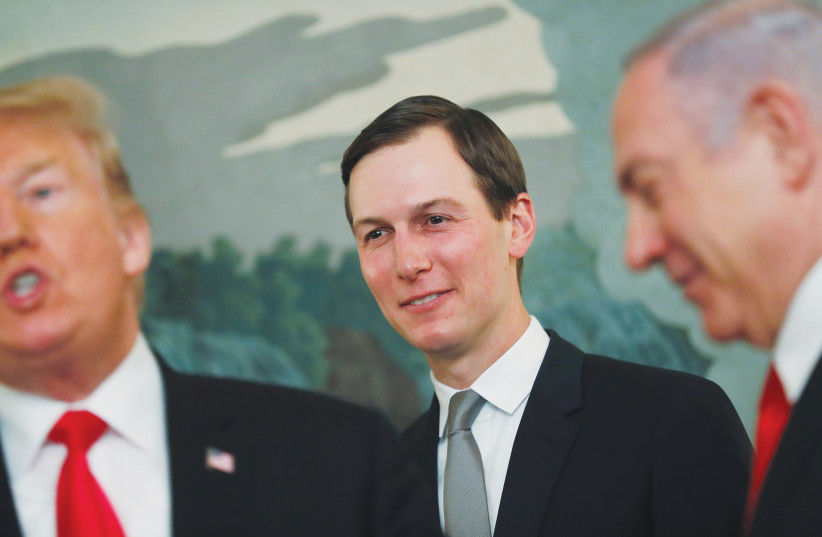 A Newsweek cover piece earlier this month on Jared Kushner, US President Donald Trump’s son-in-law and all-purpose adviser who is a key player in the president’s reelection campaign, concluded by saying that “it’s lucky for Kushner that he likes hard challenges. Getting Donald Trump reelected may not be as tough as achieving Mideast peace. But it’s close.”
A Newsweek cover piece earlier this month on Jared Kushner, US President Donald Trump’s son-in-law and all-purpose adviser who is a key player in the president’s reelection campaign, concluded by saying that “it’s lucky for Kushner that he likes hard challenges. Getting Donald Trump reelected may not be as tough as achieving Mideast peace. But it’s close.”
The two – getting Trump reelected and achieving Middle East peace – came together on Sunday when Kushner led a high level US delegation on a Middle East tour that started in Israel, and will run this week through the United Arab Emirates, Bahrain, Saudi Arabia, and possibly Oman and Morocco.
The purpose of the trip – which will include the first-ever direct commercial flight from Tel Aviv to Abu Dhabi on Monday along with a large Israeli delegation – is intended to consolidate the US-brokered Israel-UAE deal, and convince other countries to get on board.
In the last four weeks alone, an article in The Atlantic called Kushner “The Second Most Powerful Man in the White House,” and Newsweek determined that he is “the most influential presidential relative – first ladies aside – since Robert F. Kennedy served as attorney-general for his brother, President John F. Kennedy.”
So for Kushner – whose portfolio of issues extend from defeating COVID-19 to getting Trump reelected – to drop everything to fly to the Middle East to consolidate the “Abraham Accord,” as the Israel–UAE deal has been dubbed, and build on them, shows how important this is to the White House. Because everything comes at the expense of something else: and if Kushner is here, jumping from Middle East capital to Middle East capital, he is not in the US helping to run the Trump campaign, at a time when the campaign is entering a critical stage.
Kushner’s arrival on Sunday coincided with some good polling news for the Trump campaign. A Yahoo News-YouGov poll released on Saturday shows that Democratic nominee Joe Biden’s lead in the polls, which for weeks has stood at double digits, was reduced in the aftermath of last week’s Republican National Convention to six points, the smallest margin in two months. At least in this poll.
Kushner is obviously hoping to use his Middle East trip to build on that momentum and cast Trump in the role of Middle East peacemaker.
To that end, one of the delegation’s goals is reportedly to get a number of Arab countries to agree to show up at a signing ceremony in Washington before the November 3 US elections that would be attended by Israeli and UAE leaders. Such a ceremony – sure to be full of pomp and circumstance – would obviously be a boon for Trump’s campaign.
Even though the US elections will center on the COVID-19 crisis and the fraught issues of race relations and law enforcement – with foreign relations pushed far down on the agenda – having the signing of the first peace agreement between Israel and an Arab state in 26 years on the White House lawn just weeks before the elections would help dispel the Democratic claim that Trump is responsible for making the world a more dangerous place.
AND WHILE some might advise Israel not to overdo it, to be wary about being used as a prop in Trump’s reelection campaign and open itself up to criticism that it is trying to get Trump reelected, it is worth noting that there is another country involved in this dance – the UAE – and that there has been little criticism leveled at it for supposedly using this deal to get Trump reelected.
There has been much speculation as to the UAE’s motivation in taking the bold step it did toward normalizing ties with Israel now, including a desire to stave off Israeli annexation of parts of the West Bank, strengthening the “Camp of Stability” in the region working against Iran and Turkey, and wanting to be able to purchase US F35s that it has so far been unable to buy.
It is also possible that one of the UAE’s considerations is to provide an electoral boost for Trump, with whom it – along with Saudi Arabia – has forged a close relationship.
And why would the UAE like to see a second Trump term in office? Because it has concerns that a Biden presidency might rollback Trump’s tough Iran policies. Biden has said he wants to reenter the Iranian nuclear deal, known as the Joint Comprehensive Plan of Action – a move that, if it would happen, could once against embolden Iran, something that would harm the interests of the UAE and other Gulf countries, as much as it would be bad for Israel.
This fear of Iran is also expected to be among the arguments that Kushner and the US team will use in trying to convince other countries to jump on the normalization bandwagon now: arguing that the time to strengthen the pragmatic camp in the Middle East against Iran is before a possible Biden presidency and a reassessment – and possible realignment – of Washington’s Iran policies.
If these countries do get on the wagon now, Kushner would be making strides toward accomplishing what Newsweek intimated, rightfully, is almost an impossible task: brokering Middle East peace and getting Trump reelected. Considering the time Kushner is spending on the Middle East precisely now – at this critical juncture in the campaign – he apparently believes the two are linked.
Follow us on twitter (ajuede.com) or on Instagram (ajuedeman) for details of the global situation presently.






.jpeg)
Comments
Post a Comment